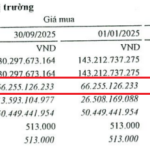On November 22nd, Deputy Prime Minister Le Thanh Long, under the authorization of the Prime Minister, presented the draft Law on Corporate Income Tax (CIT) Amendments.
One notable proposal by the Government is to impose a tax on foreign businesses providing goods and services through e-commerce and digital platforms, with taxable income generated in Vietnam.

Deputy Prime Minister Le Thanh Long presents the draft CIT Law. Photo: Nhu Y
The draft law also proposes to tax e-commerce platforms and digital technology platforms through which foreign enterprises provide goods and services in Vietnam.
According to Deputy Prime Minister Le Thanh Long, these amendments aim to enhance policy transparency and facilitate tax administration. They will also provide a solid legal basis for the collection, payment, and management of taxes on foreign businesses providing goods and services to organizations and individuals in Vietnam through e-commerce and digital platforms.
Potential limitations in capturing taxable income
Expressing the reviewing agency’s perspective on the above content, Mr. Le Quang Manh, Chairman of the National Assembly’s Finance and Budget Committee, pointed out the need to clarify the practical possibility of collecting CIT from foreign businesses without a physical presence in Vietnam but selling goods through e-commerce transactions.

Mr. Le Quang Manh, Chairman of the Finance and Budget Committee. Photo: Nhu Y
Mr. Manh stated that, regarding e-commerce, the common practice in other countries is to impose CIT only on foreign service providers. Transactions involving goods are treated as regular import-export transactions, subject to indirect taxes, not CIT.
Concerning the taxation of “taxable income generated in Vietnam” for foreign businesses engaged in e-commerce and digital platforms with a permanent establishment in Vietnam, the Finance and Budget Committee opined that this regulation might not capture all taxable income.
Regarding the definition of a permanent establishment for “e-commerce platforms and digital technology platforms through which foreign enterprises provide goods and services in Vietnam” (virtual permanent establishment), Mr. Manh shared that many agreed to include this provision to expand Vietnam’s taxing rights when foreign enterprises have a virtual permanent establishment in the country.
However, he also acknowledged concerns about the practical application of this concept, as it is a new provision in the law, and Vietnam’s tax treaties with other countries do not include similar regulations.
The Young and Venerable Vietnamese Brand Embraces E-commerce with a Powerful Transformation
In today’s competitive landscape, brands with ages ranging from five years to half a century are embracing e-commerce to expand their customer reach. One such brand even achieved a record-breaking 350% growth after going online.
“Digital Culture Deficit Hinders Digital Transformation”
The “try-fail-fix” or “dare-to-fail” culture is instrumental in fostering an innovative and resilient business environment. This culture encourages a trial-and-error approach, where employees are unafraid to take calculated risks and embrace failure as a stepping stone to success. By embracing this mindset, businesses create a dynamic and adaptive organization capable of staying ahead of the competition.













































